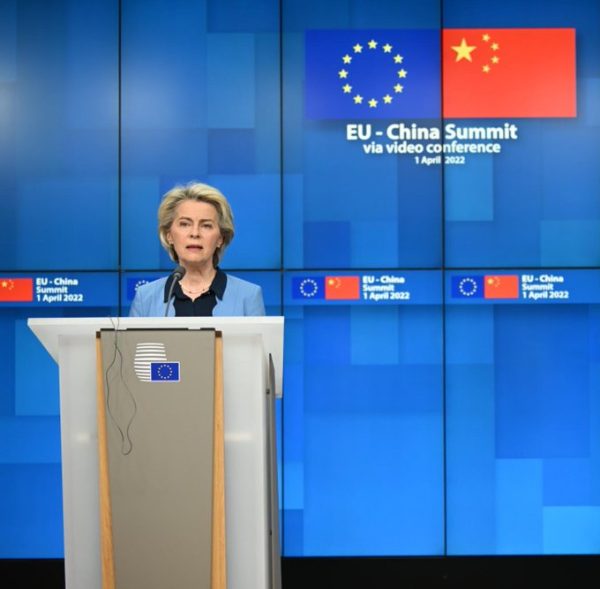
On April 1, China and the European Union held a much-anticipated summit, their first top-level meeting since the Russian invasion of Ukraine began. First, European Council President Charles Michel and European Commission President Ursula von der Leyen held a virtual meeting with Chinese Premier Li Keqiang; two hours later they talked with China’s President Xi Jinping.
The call came just days after China hosted Russian Foreign Minister Sergey Lavrov for a multilateral discussion on Afghanistan. In a meeting with Lavrov, China’s foreign minister declared that “China-Russia relations have withstood the test of the changing international situation” and “[b]oth sides are more determined to develop bilateral relations and more confident in advancing cooperation in various fields.”
Those sentiments are widely read in the EU as Beijing offering support for Russia’s war effort in Ukraine. It’s hard to overstate the momentous impact the invasion has had on European perceptions of security and foreign policy. Germany’s government calling the Russian invasion of Ukraine a turning point in history, and Germany as well as the rest of Europe has signaled increased investment in their militaries.
With Europe scrambling to adjust to a direct threat, China’s approach to the invasion has struck a sour note, to say the least. Beijing has refrained from issuing any criticisms of Russia’s actions, instead repeatedly blaming NATO for “pushing [Russia] to the wall.”
The Ukraine issue featured heavily in the summit. According to Michel: “The EU’s top priority is to stop the war and protect the Ukrainian people. In times of crisis, dialogue is needed more than ever. That’s why the EU and #China focused on what can be done to end this war as soon as possible.”
“We call on China to help end this war,” he added. “China cannot turn a blind eye to Russia’s violation of international law.”
Von der Leyen struck a similar note, saying that the EU and Chinese leaders had an “open and frank exchange” on the Ukraine crisis. “There must be respect for international law and Ukraine’s sovereignty and territorial integrity. China, as a Permanent member of the UN Security Council, has a special responsibility,” she tweeted.
Meanwhile, Wang Lutong, the director of European affairs at China’s foreign ministry took a different emphasis in his summary, tweeting that Li, Michel, and von der Leyen “positively evaluated the progress of [China-EU] cooperation and agreed to hold high-level environment, trade, and digital dialogues as soon as possible.” He added a note about “dialogue on energy security and food security” before finally, in a third tweet, mentioning: “They also exchanged views on the crisis in #Ukraine.”
In its post-meeting summaries, China tried to play up similarities and possibility for China-EU cooperation “We should counter the instability of the world situation with the stability of China-EU relations,” Wang summarized Xi as saying. “China and the EU share extensive common interests and a solid foundation for cooperation, and that only through cooperation and coordination can the two sides resolve problems and rise to challenges,” Xi said, according to the Foreign Ministry read-out.
For its part, the EU expressed interest in cooperation on COVID-19 and climate change but made it clear that this is secondary to the Ukraine crisis. Amid the war, “China’s reputation is at stake,” von der Leyen said. “This is about trust, reliability and decisions on long-term investments.” She also pointedly noted that China-EU daily trade is worth 2 million euros – versus just 330 million euros with Russia.
Ukraine is not the only issue bedeviling China-EU relations, either. Von der Leyen made clear that “China must… Stop its unjustified trade measures against Lithuania.” After Lithuania’s decision to open a Taiwan Representative Office in Vilnius, China hit back with extensive – if unofficial – trade sanctions, effectively removing Lithuania as a possible source for imports. But Beijing went farther, threatening companies from third countries that included Lithuanian parts in their supply chains. In the EU, this was viewed as “a threat to the integrity of the single market and the EU as a whole.” The EU has brought a suit against China at the WTO, but Beijing thus far has refused to remove the de facto sanctions.
Von der Leyen also demanded that China lift sanctions it had imposed on members of the European Parliament, “address global concerns on human and labor rights, especially in Xinjiang,” and “improve access and conditions for EU companies in its market.”
The early Chinese read-outs, by contrast, did not emphasize specific grievances but instead highlighted the benefits of generic cooperation. The overall impression was that China was desperately trying to turn back the clock , to a simpler time in China-EU relations. Xi “recalled his visit to the EU headquarters eight years ago when he suggested that China and Europe work together to build a bridge of friendship and cooperation across the Eurasian continent,” according to the Chinese read-out.
“…China’s vision remains unchanged. If anything, it has become more relevant under the current circumstances.”
China’s “vision” for EU ties may remain the same, but the European perspective has shifted sharply since 2014. Even before the Ukraine war broke out, European leaders were raising more questions about China’s human rights violations (particularly the ramped-up campaign against the Uyghurs and the crackdown in Hong Kong), the militarization of the South China Sea, and repeated threats toward Taiwan.
Beijing has constantly urged Europe to adopt an “independent policy toward China,” something Xi repeated in the meeting on Friday. In blunter terms, China does not want Brussels to coordinate its China strategy with Washington. But in its constant repetition of this theme, Beijing misses the point: Europe has its own concerns about China, independently of the United States.
China’s response to Ukraine has raised those concerns to an existential level: If Beijing continues to back Russia, the EU’s most direct security threat, how deep can the China-EU partnership really be?
China-EU Summit Highlights Diverging Paths
Source: Frappler

0 Comments